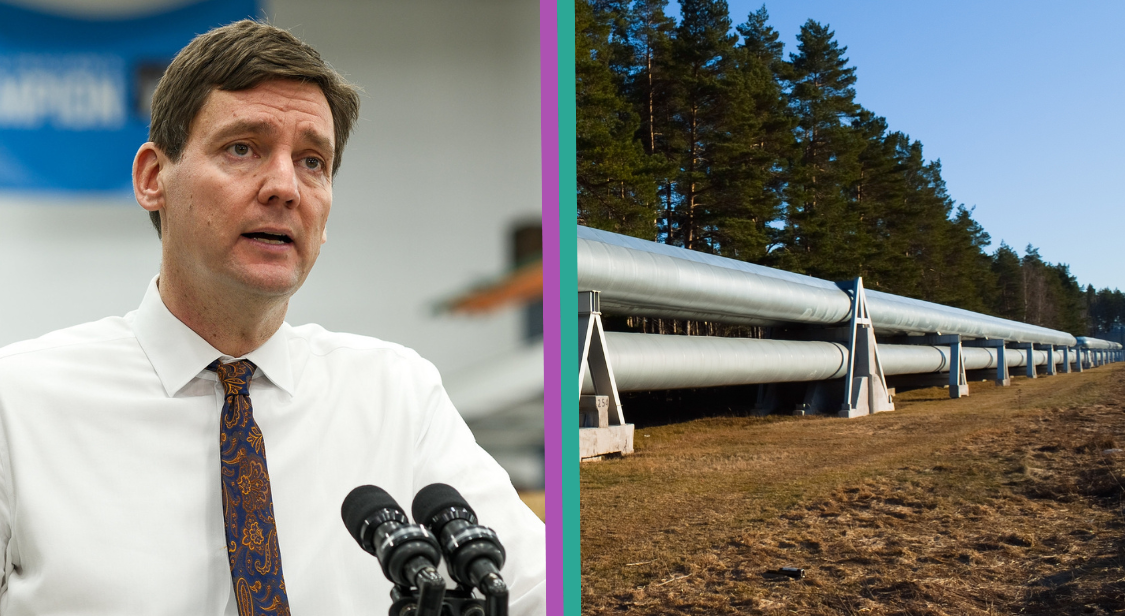It’s David Eby versus everybody else in this pipeline drama

Photos by: BCgovphotos / flickr.com, fotokaleinar / Shutterstock.com
The Topline
- Prime Minister Mark Carney and Alberta Premier Danielle Smith have signed a memorandum of understanding (MOU) outlining the necessary framework for a new pipeline from Alberta’s oil sands to B.C.’s northern coast
- B.C. Premier David Eby was excluded from the negotiations
- Alberta agreed to stricter industrial carbon pricing, and in exchange the federal government won’t implement any cap on oil and gas emissions
- The deal could include exemption to the federal ban on oil tankers along B.C.’s northern coast, something Eby is firmly against
Switch sides,
back and forth
It’s a step backward
David Eby has been firmly against any new pipelines – and he makes a strong case.
The classic argument has always been B.C. assumes all the environmental risk, while Alberta receives the financial windfall. That position still exists, but there are so many other issues at play here.
For starters, there’s the not-so-insignificant issue of a federal ban on oil tankers along the northern coast of B.C.
“That tanker ban is in place; it’s foundational for British Columbians who value our coast,” Eby told reporters back in October. “It is foundational for First Nations whose consent we have sought and obtained for literally tens of billions of dollars of major projects that are real, that are not taxpayer-funded, that will drive forward the B.C. and the Canadian economy for years to come.”
In other words, Eby has specific projects in mind, like the North Coast Transmission Line and Ksi Lisims LNG , which prioritize B.C.’s economy (not Alberta’s). He needs First Nations to buy in on his preferred projects, otherwise they’ll never get built.
If Eby comes out and supports the pipeline and removal of the tanker ban, he risks angering First Nations, which would stall his projects, and make life a lot more difficult for him as a result.
That’s why if you’re the premier of B.C., you could care less about Alberta’s prized pipeline, and instead voice support for homegrown, B.C.-based projects that are more likely to garner support from local First Nations.
B.C.’s Coastal First Nations have already announced their opposition for a new oil pipeline, suggesting it will “never happen.” They may take the federal government to court and if a judge sides with the First Nations, any project could be stopped outright .
Let’s also not ignore the fact that no private company has expressed any desire to build Smith’s new pipeline. Meanwhile, Eby’s projects are on the table and already have support from the prime minister.
Lastly, the B.C. government makes a good point: If Alberta really wants to increase capacity for more oil, why not make more use of the existing Trans-Mountain pipeline?
Canadians already paid $34 billion to expand Trans-Mountain, the existing pipeline from Alberta to Vancouver’s port. More capacity could be added for another $4 billion. That’s a fraction of the cost of building a new pipeline. The B.C. government has even pre-approved the dredging of Burrard Inlet to support bigger ships loading even more oil from the existing terminus of Trans-Mountain.
Eby wasn’t voted to office by Albertans. His mandate is to serve the interests of British Columbians and he’s saying the best approach for B.C. is maintaining the tanker ban, keeping positive relations with First Nations, and expanding the existing Trans-Mountain pipeline.
A necessary “first step” forward
It’s not Danielle Smith making the strongest case for why Canada needs another oil pipeline. It’s U.S. President Donald Trump.
For years, Canada’s economy has benefited from a favourable trading relationship with the United States. But last year, that all changed when Trump decided to upend his relationship with Canada (along with almost every other nation).
If the tariffs aren’t bad enough, Canada continues to sell its oil to the U.S. at a “discount.” The reasons for the discount are complicated. But ultimately, as long as Canada’s oil is largely landlocked, the U.S. by default becomes our biggest customer, and that gives them leverage over the price they pay.
For these reasons alone, Carney needs to prioritize increasing global trade with countries other than the U.S. – and fast.
What’s the lowest hanging fruit? Oil and gas. Like it or not, Canada is an oil-rich nation. We’re the world’s fourth-largest oil producer, behind only the United States, Saudi Arabia, and Russia.
Canadians are coming around. Research from October indicates a majority of Canadians, including B.C. residents, support the idea of a pipeline to the north coast.
And while B.C. has gone on record to oppose a new pipeline, Ottawa calls the shots here. The Constitution Act 1982 lays it all out . Because an oil pipeline is “interprovincial” it falls under federal oversight.
So if you’re Mark Carney, this is a no brainer, right? Well, not exactly.
More oil means more climate change, more pipelines, and more tankers that could spill oil and destroy the environment. That can’t be ignored.
Meanwhile, some say the world’s demand for oil is sunsetting and will reach its peak by 2030.
The biggest challenge will be navigating the rights of First Nations. While Ottawa holds the cards over B.C., First Nations hold the cards over Ottawa. Those First Nations who oppose the pipeline can challenge it in court. If a judge agrees with them, the project won’t happen.
Still, Carney has called this MOU a necessary “first step” that “clears the path” to a proposal – and, to be clear, this doesn’t guarantee that a pipeline will be built. But Ottawa’s job is Canada first, and Canada’s economy does not survive without reliable access to global markets, and this is a necessary step in that direction.
Danielle Smith may be loud, and David Eby may be firm, but there’s a third actor in this drama that everyone keeps forgetting: the rest of the country that actually needs the thing.
